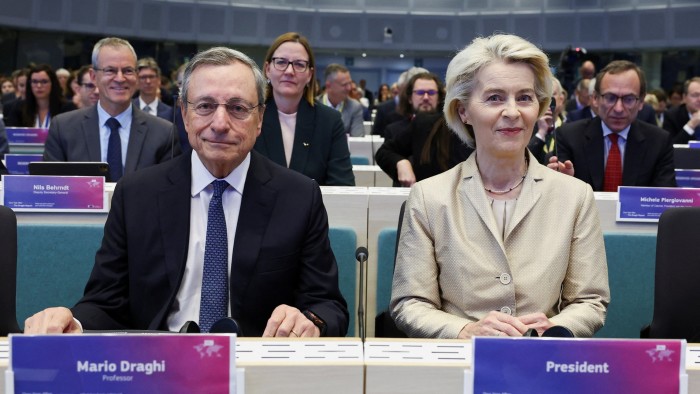Unlock the Editor’s Digest for free
Roula Khalaf, Editor of the FT, selects her favourite stories in this weekly newsletter.
EU capitals are watching with alarm as US President Donald Trump tramples on political and commercial norms at home and globally — while privately wondering if America’s misfortunes might open up opportunities for Europe. If so, the opportunities are not being seized.
A year after Mario Draghi’s doorstep-sized report urged the EU to improve its competitiveness, the former Italian prime minister warned instead last week that the bloc was falling further behind its global rivals. For all the efforts to bolster resilience in the face of Trump’s tariffs and demands for Europe to fund more of its own defence, Draghi warned that “inaction” on structural reforms by Brussels and EU states “threatens not only our competitiveness but our sovereignty itself”.
It was a damning verdict, but not unfair. Of Draghi’s 383 recommendations, including integrating capital markets, strengthening supply chains and aligning business regulations, an audit by the European Policy Innovation Council found only 11 per cent had been adopted. Deutsche Bank analysts found most progress had been in scaling up the defence industry, where the urgency was felt most strongly, and in areas of least resistance such as cutting red tape — though this had sometimes been done in ham-fisted ways.
European officials have argued that Ursula von der Leyen, European Commission president, and national leaders have been preoccupied with handling Trump’s tariff threats and wayward policies on Ukraine. The realities are more complex. Many of Draghi’s recommendations have been adopted into the commission’s work programme. In January, Brussels unveiled a Competitiveness Compass, condensing some of his core ideas into specific goals such as revamping capital rules to let banks invest more freely and joint purchases of critical raw materials. But the EU executive has held back from pursuing some of Draghi’s bolder ideas, such as joint funding for vital strategic industries and infrastructure projects.
That leaves it to national governments to finance most industrial policy and investment decisions themselves. Many key reforms such as those affecting tax policy, labour markets and pensions have to be pursued at member state level — where political barriers and national sensitivities abound.
Plenty of low-hanging fruit could, however, be pursued more rapidly. The single market remains far from complete; there has been far too little progress towards a capital markets union to create a deeper funding pool out of Europe’s scattered and shallow money markets.
One area that deserves a push is the “28th regime” — or enabling companies to incorporate directly under a pan-EU legal code that would sit alongside the 27 national legal systems. This would enable companies including start-ups to expand across EU borders without having to deal with new rules each time — allowing them to scale up much faster and unlock the potential that the 450mn-strong single market is supposed to offer.
Draghi also called for speeding up the review of merger rules he recommended, now being carried out by the EU’s competition chief Teresa Ribera. It is important to get reforms here right. But the launch of the review has slowed corporate activity as business executives wait for clarity before making investment decisions.
Where not all capitals can agree, EU countries should form “coalitions of the willing” to move forward with certain initiatives. Above all, the priority is to break out of the inertia that, as Draghi notes, is sometimes even presented as “respect for the rule of law”. In fact, he says, it represents complacency. Trump or no Trump, that is a luxury an ossifying EU cannot afford.
